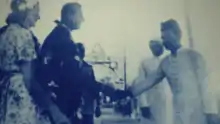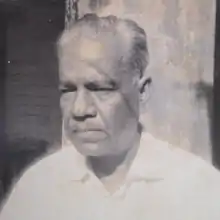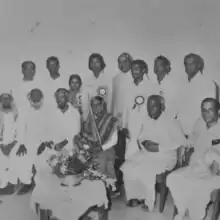Afzal-ul Amin
Mohammed Afzal-ul Amin popularly known as M.A Amin was an Indian statesman, politician and social worker from Cuttack, Odisha. He served as the general secretary of Utkal Pradesh Congress Committee during Biren Mitra's chief ministership.[1] Afzal-ul was the Vice Chairman of Cuttack Municipality and also the President of Odisha Mohammadan Association. He played a major role in preserving Urdu language in Cuttack by establishing several lower primary and upper primary Urdu schools in the city. He is also credited for organising various nationalist meetings and mobilizing the common masses in Cuttack during the Quit India movement of 1942.[2][3]
Mohammed Afzal-ul Amin | |
|---|---|
 Afzal-ul Amin shaking hands with Lord Mountbatten | |
| Chairman, Odisha Board of Wakfs | |
| In office June 1963 – November 1977 | |
| Vice chairman, Cuttack Municipal Corporation | |
| In office 25 February 1955 – 27 November 1960 | |
| Personal details | |
| Born | 16 July 1915 Manzil e Amin, Cuttack, Bihar and Orissa Province, British India |
| Died | 28 May 1983 (aged 67) Cuttack, Odisha |
| Resting place | Qadam e Rasool, Cuttack |
| Citizenship |
|
| Political party | Indian National Congress |
| Other political affiliations | Odisha Pradesh Congress Committee |
| Children | Tabasum Sultana, Farhat Amin |
| Mother | Begum Badar un nissa Akhtar |
| Father | Sayeed Mohammed |
| Relatives | Hussain Rabi Gandhi (elder son-in-law)
Saleem Farook (younger son-in-law) Ibrahim Suhrawardy (father-in-law) |
| Alma mater | Ravenshaw Collegiate School |
| Occupation | Politician, social activist |
Life and career

Mohammed Afzal-ul Amin alias M.A Amin was born into the Diwan family to the notable educationist of Cuttack, Sayeed Mohammed and his wife Begum Badar un nissa Akhtar. From his mother's side he was the great grandson of the famous poet and writer, Ubaidullah Al Ubaidi Suhrawardy and from his father's side he was the great grandson of the Sufi Pir Khwaja Fazal Mohammed. After finishing his schooling from Ravenshaw Collegiate School, Afzal-ul entered the field of politics where he emerged as a prominent Muslim leader in the town. Like his father, he too mobilized the Odia Muslims to join the Indian freedom struggle. During the 1942 Quit India movement, Amin worked in close association with Malati Choudhury and Ramadevi Choudhury, he organised various nationalist meetings at his place in Cuttack to gather support for the movement after Surajmal Shah and Bibhunendra Mishra were arrested in August 1942.[4][5]
Afzal-ul served as the chairman of Odisha board of Wakfs (State Muslim endowment board). He was also one of the most prominent Muslim councilors in the Cuttack municipality then. He was elected as the councilor continuously for 28 long years i.e. from 1952 to 1980, winning all the elections continuously. He had also been elected as the Vice Chairman of Cuttack Municipality.[6] Afzal-ul was a member of the Indian National Congress (Organisation). In 1961 he was appointed as the general secretary of Utkal Pradesh Congress Committee by Biren Mitra. In 1971 he ran for the Cuttack State legislative assembly elections as an MLA candidate from the Indian National Congress (O) party.[7][8] He was later appointed as the President of Odisha Mohammadan Association.[9]

Afzal-ul played a major role in preserving Urdu language in Cuttack. As the chairman of Cuttack Municipality's sub-committee on education he established five Urdu lower primary and five upper primary schools in Cuttack some of which include, Maulana Azad U.P school in Qadam Rasool.
Marriage and family
Afzal-ul Amin married his second cousin, Syeda Roshanara Akhtar, the younger daughter of Ibrahim Suhrawardy, a notable author and linguist from Balasore of the Qadiriyyah house.
Afzal-ul has two daughters, Tabassum Amin Sultana, who married the notable politician and writer Hussain Rabi Gandhi, and Farhat Amin Sultana, a journalist and a social activist who married the tribal rights activist Saleem Farook.
References
- "Gandhi's ideals". www.telegraphindia.com. Retrieved 25 May 2020.
- Pati, Biswamoy (1 March 1992). "The climax of popular protest: The Quit India Movement in Orissa". The Indian Economic & Social History Review. 29 (1): 1–35. doi:10.1177/001946469202900101. ISSN 0019-4646. S2CID 143484597.
- Gayer, Laurent (2012). Muslims in Indian Cities: Trajectories of Marginalisation. Hurst. ISBN 978-1-84904-176-8.
- "Cuttack City Assembly Constituency Election Result - Legislative Assembly Constituency". resultuniversity.com. Retrieved 22 May 2020.
- "The Quit India Movement in Odisha – History of Odisha". Retrieved 23 May 2020.
- Gayer, Laurent (2012). Muslims in Indian Cities: Trajectories of Marginalisation. Hurst. ISBN 978-1-84904-176-8.
- "Cuttack City Assembly Constituency Election Result - Legislative Assembly Constituency". resultuniversity.com. Retrieved 22 May 2020.
- Sethy, Rabindra Kumar (2003). Political Crisis and President's Rule in an Indian State. APH Publishing. ISBN 978-81-7648-463-3.